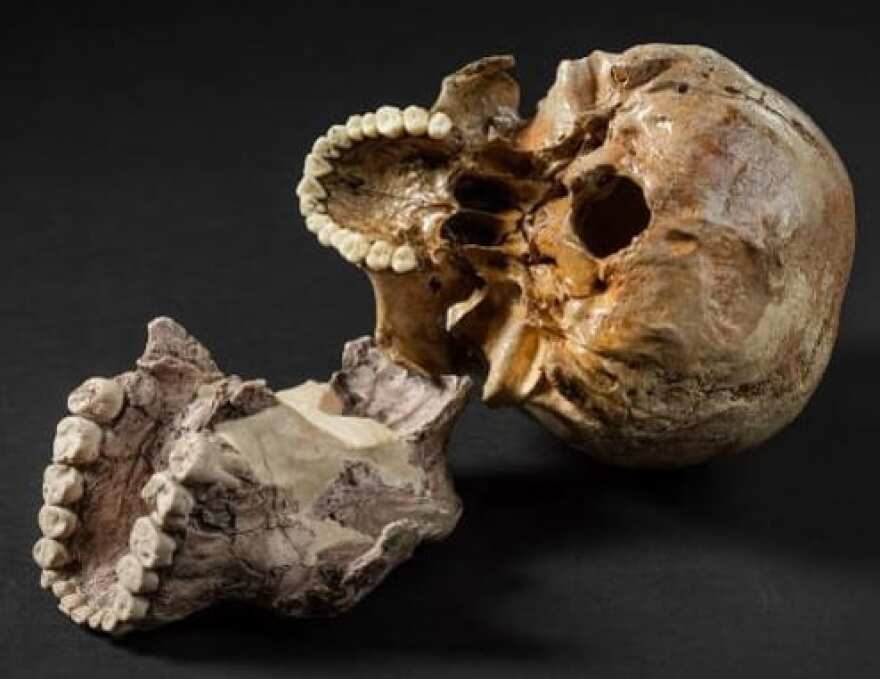Brush, floss and then forget. The odds are, unless teeth are causing pain, we don't think about them much.
But for Dr. Peter Ungar, what he calls "ready-made fossils" in human mouths have a lot to tell us about the past and how to prevent pain in the future.
Ungar, an anthropologist at the University of Arkansas, and author of Evolution’s Bite: A Story of Teeth, Diet, and Human Origins, shuffles through drawers in his laboratory, pulling out bags of ancient teeth. This is the Ungar Lab, where the focus of research is on the ecology and evolution of past mammals, especially our human ancestors.

Ungar selects a blue dental mold of a human tooth, then reaches over and grabs an ancient jawbone.
"Here for example is the lower jaw of a species called Paranthropus that lived about 2 million years ago."
The skeletal remnant from Hominin Paranthropus -- an early human ancestor -- is shedding light on how our modern mouths developed.
"We can see how changes in diet that have occurred over time are impacting our oral health today and hopefully informing clinical practice going forward," Ungar says.
His recent work with the Hadza people of Tanzania, among the last remaining hunter-gatherers persisting in Africa, has revealed groundbreaking discoveries. He says that research around oral health, specifically the rise of tooth decay, hinges on the shift from hunter-gatherer to agricultural societies. That’s because early diets – think "paleo diet" — were mostly devoid of carbohydrates including grains and starches which turn to sugar in the mouth and can cause cavities. Research indicates that when carbohydrates became a staple of human diets, it wreaked havoc on human oral health.
But Ungar says his research reveals that isn’t the whole story.

“I found really high rates of cavities in the Hadza men,” he says. “And we were really scratching our heads. Because if you look at the bio-archeological [evidence] pre-agriculture there are very few cavities in the mouth, the teeth are beautiful.”
The problem with early research, he says, is that it doesn’t fully factor for all environments and foods early humans consumed. So, while the Hadza may have a low-carb diet, they are not immune to dental caries from other sources of sugar -- specifically foraged honeycombs.
“When you look at the tropics you see that [hunter-gatherer] men will often consume honey. And the honey will get trapped between wax residue on their teeth and that causes high rates of cavities.”
In another part of the Ungar Lab, undergraduate student Dylan Elkington-Stauss sits at a computer and fidgets with an ancient human tooth he has placed under a microscope.

A scratchy, grey image pops up on the screen resembling more of a topographic map of the moon than a tooth. Stauss says the tiny indentations reveal dietary patterns. He's researching tooth enamel erosion.
“Right now it’s pricey to diagnose [dental tooth erosion] and partial destruction to the tooth happens too, so we’re trying to see if we can diagnosis it using the scanner.”
His research, funded by the National Institutes of Health, may lead to the development of non-invasive handheld device that can monitor and treat erosive tooth wear -- in present culture primarily caused by sugary drinks according to the American Dental Association.
Elkington-Stauss says the Ungar Lab is different from other dental research labs because it looks at human oral health holistically.
“There is a cultural component to erosive tooth-wear,” he says. “That’s why it’s probably a good thing that we’re doing this work in a lab like this, because we can analyze and understand it better on all those levels.”
For Ungar, his research goal is to help people understand that there is more to oral health than just brushing and flossing. It’s also about human foodways.
“Diet is a key to everything that we do," he says. "And if we’re going to understand evolution as a result of environmental change, we have to know something about diet."
And the best way to understand oral health links to ancient human diets is through examing ancient teeth.
Support for this series on oral health in Arkansas comes from the Delta Dental of Arkansas Foundation, working to increase access to dental care in the state and improve the oral health of all Arkansans.
This story is produced by Arkansas Public Media, a statewide journalism collaboration among partner stations KUAR, KUAF, KASU and KTXK, and community partners AETN, and the Butler Center for Arkansas Studies. Arkansas Public Media’s series on oral health in Arkansas is funded through a grant from the Delta Dental of Arkansas Foundation, and with the support of its partner stations.



